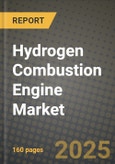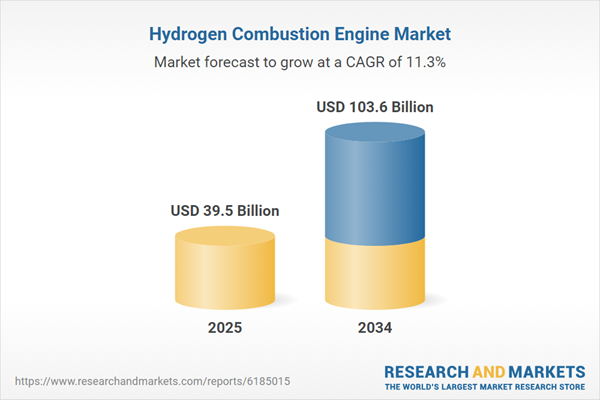The Hydrogen Combustion Engine Market is at the forefront of the energy transition, offering an innovative approach to reducing carbon emissions while maintaining the performance and reliability associated with traditional internal combustion engines. These engines use hydrogen as a fuel source, which burns cleanly and produces only water vapor as a byproduct, making them an attractive option for transportation and industrial applications seeking to meet stricter environmental standards. Unlike fuel cells, hydrogen combustion engines leverage established engine designs and manufacturing processes, potentially reducing costs and accelerating adoption. This market is driven by growing regulatory pressure, advancing hydrogen infrastructure, and increasing investment in green technologies. Key industries such as heavy-duty trucking, marine, and rail are exploring hydrogen combustion as a viable alternative to conventional fuels, providing a pathway toward cleaner and more sustainable operations.
The Hydrogen Combustion Engine Market saw significant progress as key players introduced next-generation prototypes and scaled up production capabilities. Regulatory incentives and government funding boosted research and development efforts, encouraging collaborations between automotive manufacturers, energy companies, and technology providers. Pilot projects and demonstration programs were launched across Europe, North America, and Asia-Pacific, showcasing the feasibility of hydrogen-powered vehicles in diverse applications. Meanwhile, the expansion of hydrogen refueling infrastructure gained momentum, supported by public-private partnerships and ambitious national hydrogen strategies. Advances in hydrogen storage technologies and combustion efficiency were among the notable technical achievements. Despite these gains, the market faced challenges such as high production costs, limited economies of scale, and the need for widespread infrastructure investment. Nevertheless, 2024 marked a year of steady progress and growing interest in hydrogen combustion as a key component of the decarbonized transportation landscape.
Looking forward, the Hydrogen Combustion Engine Market is expected to accelerate as global momentum around hydrogen strengthens. Large-scale adoption of hydrogen combustion technology in heavy-duty transport sectors is anticipated, driven by rising fuel costs, tougher emissions regulations, and the push for energy independence. Continuous improvements in hydrogen combustion efficiency, emissions control systems, and material durability will further enhance the market’s competitiveness. Integration with renewable hydrogen production methods will play a pivotal role in reducing the carbon footprint of hydrogen-powered vehicles. Additionally, partnerships among automotive manufacturers, energy firms, and hydrogen technology providers will intensify, fostering innovation and enabling rapid commercialization. As hydrogen infrastructure becomes more robust and cost-effective, hydrogen combustion engines will emerge as a mainstream option in the global transition to cleaner transportation and industrial systems. By leveraging existing engine technology while aligning with future energy trends, the hydrogen combustion engine market is poised to become a cornerstone of the sustainable mobility ecosystem.
Key Insights: Hydrogen Combustion Engine Market
- Ongoing development of hydrogen refueling infrastructure, particularly along major freight corridors, is facilitating greater adoption of hydrogen-powered vehicles.
- Advances in hydrogen storage technology, including lightweight composite tanks and cryogenic storage solutions, are improving vehicle range and fueling convenience.
- Collaborations between automotive OEMs, hydrogen producers, and energy companies are accelerating technological innovation and market readiness.
- Hybrid hydrogen combustion engines, which integrate hydrogen with other fuels, are being explored to offer flexibility and transitional benefits.
- Growing regulatory pressure and government incentives are creating a favorable environment for hydrogen combustion engine development and deployment.
- Rising global commitments to reduce greenhouse gas emissions are spurring investment in hydrogen combustion as a low-carbon alternative to conventional fuels.
- Increasing fuel prices and the need for energy security are driving interest in hydrogen as a cost-competitive, locally produced energy source.
- Government subsidies, tax credits, and research grants are providing crucial financial support for hydrogen combustion engine development and deployment.
- Enhanced public and private sector collaboration is accelerating the scale-up of hydrogen production, storage, and distribution networks.
- High costs associated with hydrogen production, storage, and refueling infrastructure remain a significant barrier to widespread adoption of hydrogen combustion engines.
Hydrogen Combustion Engine Market Segmentation
By Technology
- Proton Membrane Exchange
- Phosphoric Acid Fuel Cell
- Other Technologies
By Installation
- OEM (Original Equipment Manufacturer)
- Retrofit
By Application
- Passenger Vehicle
- Commercial vehicle
- Ships
- Other Applications
Key Companies Analysed
- Toyota Motor Corporation
- Stellantis N.V.
- Ford Motor Company
- General Motor Company
- Honda Motor Co. Ltd.
- Robert Bosch GmbH
- Caterpillar Incorporated
- Rio Tinto Group
- Renault SA
- Bayerische Motoren Werke AG
- Magna International Inc.
- Mitsubishi Heavy Industries
- Cummins Inc.
- Komatsu Ltd.
- Rolls-Royce Holdings plc
- Mahindra and Mahindra Ltd.
- AGCO Corporation
- Air Products and Chemicals Inc.
- MAN Energy Solutions
- Plug Power Inc.
- Bloom Energy Corporation
- Ballard Power Systems Inc.
- Proton Motor Fuel Cell Inc.
- PowerCell Sweden AB
- H2 PowerTech LLC
- HyTech Power LLC
- Origin Engines Inc.
- Hyzon Motors Inc.
- Loop Energy Inc.
Hydrogen Combustion Engine Market Analytics
The report employs rigorous tools, including Porter’s Five Forces, value chain mapping, and scenario-based modeling, to assess supply-demand dynamics. Cross-sector influences from parent, derived, and substitute markets are evaluated to identify risks and opportunities. Trade and pricing analytics provide an up-to-date view of international flows, including leading exporters, importers, and regional price trends.Macroeconomic indicators, policy frameworks such as carbon pricing and energy security strategies, and evolving consumer behavior are considered in forecasting scenarios. Recent deal flows, partnerships, and technology innovations are incorporated to assess their impact on future market performance.
Hydrogen Combustion Engine Market Competitive Intelligence
The competitive landscape is mapped through proprietary frameworks, profiling leading companies with details on business models, product portfolios, financial performance, and strategic initiatives. Key developments such as mergers & acquisitions, technology collaborations, investment inflows, and regional expansions are analyzed for their competitive impact. The report also identifies emerging players and innovative startups contributing to market disruption.Regional insights highlight the most promising investment destinations, regulatory landscapes, and evolving partnerships across energy and industrial corridors.
Countries Covered
- North America - Hydrogen Combustion Engine market data and outlook to 2034
- United States
- Canada
- Mexico
- Europe - Hydrogen Combustion Engine market data and outlook to 2034
- Germany
- United Kingdom
- France
- Italy
- Spain
- BeNeLux
- Russia
- Sweden
- Asia-Pacific - Hydrogen Combustion Engine market data and outlook to 2034
- China
- Japan
- India
- South Korea
- Australia
- Indonesia
- Malaysia
- Vietnam
- Middle East and Africa - Hydrogen Combustion Engine market data and outlook to 2034
- Saudi Arabia
- South Africa
- Iran
- UAE
- Egypt
- South and Central America - Hydrogen Combustion Engine market data and outlook to 2034
- Brazil
- Argentina
- Chile
- Peru
Research Methodology
This study combines primary inputs from industry experts across the Hydrogen Combustion Engine value chain with secondary data from associations, government publications, trade databases, and company disclosures. Proprietary modeling techniques, including data triangulation, statistical correlation, and scenario planning, are applied to deliver reliable market sizing and forecasting.Key Questions Addressed
- What is the current and forecast market size of the Hydrogen Combustion Engine industry at global, regional, and country levels?
- Which types, applications, and technologies present the highest growth potential?
- How are supply chains adapting to geopolitical and economic shocks?
- What role do policy frameworks, trade flows, and sustainability targets play in shaping demand?
- Who are the leading players, and how are their strategies evolving in the face of global uncertainty?
- Which regional “hotspots” and customer segments will outpace the market, and what go-to-market and partnership models best support entry and expansion?
- Where are the most investable opportunities - across technology roadmaps, sustainability-linked innovation, and M&A - and what is the best segment to invest over the next 3-5 years?
Your Key Takeaways from the Hydrogen Combustion Engine Market Report
- Global Hydrogen Combustion Engine market size and growth projections (CAGR), 2024-2034
- Impact of Russia-Ukraine, Israel-Palestine, and Hamas conflicts on Hydrogen Combustion Engine trade, costs, and supply chains
- Hydrogen Combustion Engine market size, share, and outlook across 5 regions and 27 countries, 2023-2034
- Hydrogen Combustion Engine market size, CAGR, and market share of key products, applications, and end-user verticals, 2023-2034
- Short- and long-term Hydrogen Combustion Engine market trends, drivers, restraints, and opportunities
- Porter’s Five Forces analysis, technological developments, and Hydrogen Combustion Engine supply chain analysis
- Hydrogen Combustion Engine trade analysis, Hydrogen Combustion Engine market price analysis, and Hydrogen Combustion Engine supply/demand dynamics
- Profiles of 5 leading companies - overview, key strategies, financials, and products
- Latest Hydrogen Combustion Engine market news and developments
Additional Support
With the purchase of this report, you will receive:- An updated PDF report and an MS Excel data workbook containing all market tables and figures for easy analysis.
- 7-day post-sale analyst support for clarifications and in-scope supplementary data, ensuring the deliverable aligns precisely with your requirements.
- Complimentary report update to incorporate the latest available data and the impact of recent market developments.
This product will be delivered within 1-3 business days.
Table of Contents
Companies Mentioned
- Toyota Motor Corporation
- Stellantis N.V.
- Ford Motor Company
- General Motor Company
- Honda Motor Co. Ltd.
- Robert Bosch GmbH
- Caterpillar Incorporated
- Rio Tinto Group
- Renault SA
- Bayerische Motoren Werke AG
- Magna International Inc.
- Mitsubishi Heavy Industries
- Cummins Inc.
- Komatsu Ltd.
- Rolls-Royce Holdings PLC
- Mahindra And Mahindra Ltd.
- AGCO Corporation
- Air Products and Chemicals Inc.
- MAN Energy Solutions
- Plug Power Inc.
- Bloom Energy Corporation
- Ballard Power Systems Inc.
- Proton Motor Fuel Cell Inc.
- PowerCell Sweden AB
- H2 PowerTech LLC
- HyTech Power LLC
- Origin Engines Inc.
- Hyzon Motors Inc.
- Loop Energy Inc.
Table Information
| Report Attribute | Details |
|---|---|
| No. of Pages | 160 |
| Published | October 2025 |
| Forecast Period | 2025 - 2034 |
| Estimated Market Value ( USD | $ 39.5 Billion |
| Forecasted Market Value ( USD | $ 103.6 Billion |
| Compound Annual Growth Rate | 11.3% |
| Regions Covered | Global |
| No. of Companies Mentioned | 29 |









